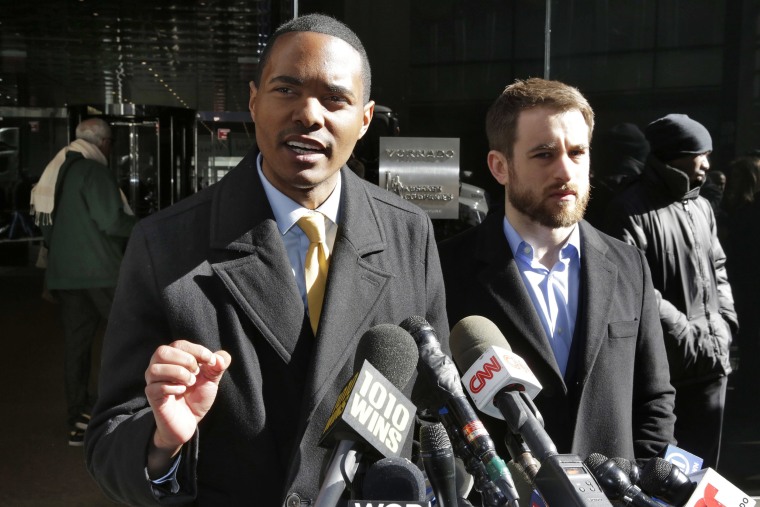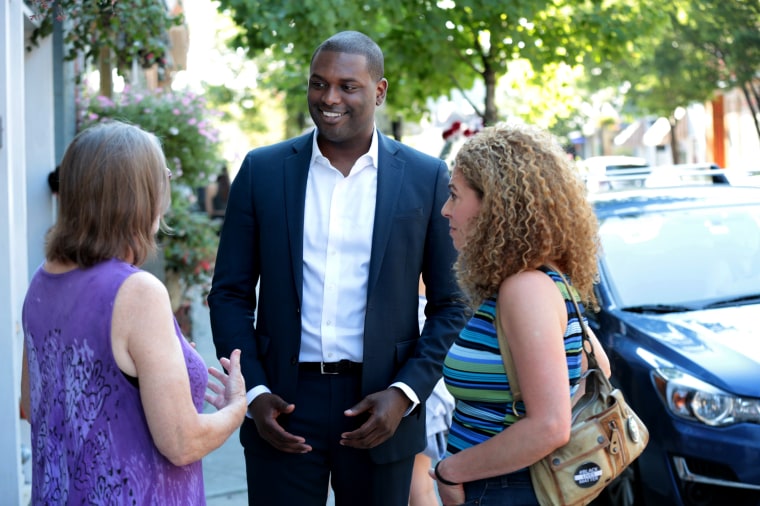At least 68 lesbian, gay, bisexual, transgender and queer candidates are on primary ballots across the country this Pride Month.
By Julie Moreau
When Ritchie Torres won his race for the New York City Council at age 25, he became the youngest elected city official in New York City and the first openly gay person elected to legislative office from the Bronx.
Now, seven years later, he is running for Congress.
«If you want a chance at being a transformative policymaker, then you have to be in Washington, D.C.,» Torres told NBC News. «That’s where the priorities are formed. That’s where the purse strings are. That’s where the future of the country is determined.»

Torres is one of at least five dozen lesbian, gay, bisexual, transgender and queer candidates who will appear on primary ballots across the U.S. this month alone. If elected, he would become the first Afro-Latinx gay person to ever serve in Congress. Before that, however, he must win his crowded Democratic primary on June 23, in which Rubén Díaz Sr. — who is known for his outspoken opposition to same-sex marriage — is leading in some polls.
«I can think of no better way to celebrate Pride Month than to retire the policies of fear and hate that Díaz Sr. represents,» Torres said. «He has cast a homophobic cloud over Bronx policies since I was a child.»
Díaz did not immediately respond to a request for comment.
If Torres emerges victorious this month, he would very likely head to Congress, as his district is the most Democratic in the nation.
As in previous election cycles, the number and diversity of LGBTQ candidates continue to grow, but unlike in previous years, candidates are confronting both a pandemic and historic protests in response to racism and police violence.
Historic firsts
During the 2020 election cycle, at least 850 LGBTQ candidates — an unprecedented number — have appeared or will appear on ballots across the U.S., according to the LGBTQ Victory Fund, a group that trains, supports and advocates for queer candidates. For comparison, in 2018, just over 700 openly LGBTQ candidates ran for office, 432 made it to the ballot in the general election and at least 150 were victorious, according to the Victory Fund.
Don Haider-Markel, a political science professor at the University of Kansas, called this year’s number of LGBTQ candidates «shocking,» although he said the overall trend toward more queer candidates fits the pattern of the last few election cycles. And with the increasing number of candidates come more LGBTQ firsts across the country.
«There are some real milestones that could be reached this cycle,» Haider-Markel said. «What you are seeing is a lot of first-time candidates running for office without some of the traditional political experience backgrounds.»
One of those candidates is Kim Jackson, a lesbian Episcopal priest running for a seat in the Georgia Senate. She is still waiting to find out whether she won her primary, which was held Tuesday, but as of Thursday she was in the lead.
«I’m running on a platform to create a safer, fairer and more prosperous Georgia,» said Jackson, who this month was named one of NBC Out’s Pride Month honorees.
If elected in November, Jackson would be the first out member in the state’s upper chamber.
«Having LGBTQ representation in the Georgia state Senate is exceptionally important,» Jackson said, «because most of the anti-LGBTQ bills originate in the Senate.»
«I hope my presence there will help us avoid those things,» she added.
Haider-Markel said that the number of transgender candidates is continuing to rise and that an increasing number of LGBTQ candidates are running in states where there is no queer representation even at the local level.
He said that even though Christine Hallquist, a trans woman, lost her bid for governor of Vermont in 2018, her candidacy «clearly motivated more people to run.»
For example, Rosemary Ketchum won her election Tuesday for the Wheeling City Council in West Virginia, becoming the first openly transgender person ever elected in the Mountain State. She officially takes office July 1.
«Rosemary has shattered a lavender ceiling in West Virginia and will join the growing number of out trans elected officials serving nationwide,» Annise Parker, president and CEO of the LGBTQ Victory Fund, said in a statement. «Trans people are severely underrepresented in elected office — with just 26 out trans officials anywhere in the country — so Rosemary’s victory will resonate well beyond her state. We know Rosemary’s race will inspire other trans people from conservative states to consider a run for office in their communities — and then those candidates will inspire others as well.»
Another first for transgender representation could be Kristen Browde, who is running for the New York Assembly. Should she claim victory in her June 23 primary and go on to win the general election in November, she would be the first openly transgender person elected in the entire state, according to the Victory Fund.
As for the representational deficit, Pat Hackett of Indiana won her primary race for Congress and is vying to become the first openly gay member of Congress from the state. Hackett will face off in November against incumbent Republican Jackie Walorski, whose track record includes voting against LGBTQ protections.

At least a dozen Black LGBTQ candidates are also on the ballot this month.
Among them is Mondaire Jones of New York, who would become the first openly gay Black member of Congress. If he joins Hackett, Torres and Tracy Mitrano in general election victories in November, they could take LGBTQ representation in the House from the current seven members to 11.
Haider-Markel expects a similar percentage of LGBTQ candidates — about 32 percent, according to the Victory Fund — to win this cycle as they did in 2018. But even if the overall success rate goes down, he said, the large number of queer candidates will likely still mean an increase in overall representation.
«The pool of candidates is really diversifying. That should also be heartening because of the intersectional identities those candidates can appeal to,» Haider-Markel said.
One candidate on track to bring her intersectional identity to political office is Jessica Benham. Benham, who is bisexual, won her Democratic primary June 2 for a seat in the Pennsylvania Legislature. Her heavily Democratic district means she will likely become the first openly LGBTQ woman elected to the Pennsylvania House and the first openly autistic person elected to any state legislature.
«I firmly believe that the ways in which we talk about policy and implement policy are deeply rooted in our lived experiences,» Benham said. «I never imagined that I would be somebody who would run for office … because I didn’t see people like me in elected office.»
Unrest and protests
LGBTQ candidates are campaigning as protesters across the country continue to march seeking justice for George Floyd, a Black man who died in police custody last month. And some candidates, like Jackson, are doing both.
«I’ve been out in the protests on the front lines, because I am clear that enough is enough,» Jackson said. She is looking to decriminalize minor traffic violations that have «been used as an excuse to get Black and brown folks out of their cars and arrest them unfairly.»
Haider-Markel expects LGBTQ candidates — who are overwhelmingly Democrats and identify as progressive — to tackle issues of police violence head on.
«Any progressive candidate running for office right now can’t not talk about these things,» he said.
Torres agrees.
«The deep rot of institutional racism at the core of the criminal justice system is so exposed that it cannot be ignored — it has to be confronted, and people are going to continue protesting until it is confronted,» he added. «It is demoralizing to live in a society that devalues Black and brown life, especially if you are a Black or brown person.»
Pandemic politics
COVID-19 has created unprecedented conditions in which candidates must campaign. The impact of the pandemic on the primary and the general election remain unclear, although Haider-Markel said he believes the pandemic and the protests highlight the situation of many of the underprivileged communities LGBTQ candidates represent.
«I made a decision to run for Congress before COVID-19,» Torres said, although he added that the health crisis has reminded him of the importance of addressing racialized poverty in the Bronx. «The racial inequalities revealed by COVID-19 are too glaring to ignore.»
The pandemic has also affected LGBTQ candidates’ ability to campaign effectively.
«I myself contracted COVID-19, which took me out of commission,» Torres said. In addition to losing precious time on the campaign trail, he said, «the rules of the election have been radically rewritten.»
«We not only have to communicate to voters about ourselves but educate them about voting absentee,» Torres said.
Confusion and delays at polling places, as occurred in Georgia on Tuesday, can depress turnout.
«Generally speaking, the belief is that lower turnout hurts Democrats, and since most LGBTQ candidates are Democrats, it could hurt them,» Haider-Markel said.
«For first-time LGBTQ candidates that don’t have prior political experience, that would likely hurt them,» Haider-Markel added. «The lack of door-to-door canvassing that is likely to result from this is going to hurt challengers. It’s going to favor incumbents and people that are already known in the community.»
The health crisis has also pushed back primary dates, forcing candidates to campaign much longer and to pivot toward digital media, phone calls and mail.
At the same time, COVID-19 has compressed the campaigning timeline for those voters choosing mail-in ballots. «Even though the primary is on June 23, much of the electorate casts their ballot before then,» Torres said.
That gives him less time to overcome the advantage of name recognition held by his opponent. «The crowded nature of the race could enable Rubén Díaz Sr. to eke out a victory at the margins.»
The pandemic has also heightened the economic insecurity affecting many Americans.
«Campaigning as if it were business as usual is callous,» Torres said. «When I am out in the field, I am not knocking on doors asking for votes. I am distributing food and personal protective equipment.»
COVID-19 has also had a devastating impact on the economy, and a bad economy tends to hurt incumbents, Haider-Markel said.
«How the economy will play out in the general election is really unclear, because it is unclear where the economy will be,» he said.
For many LGBTQ candidates, their election is also about something better for queer youth in this time of crisis.
«I think a lot about queer kids in Georgia who are longing to know that something bigger is possible for their lives. I recognize my election could be a sign of hope for people, and I am happy to be that,» Jackson said.





